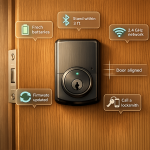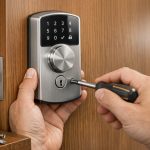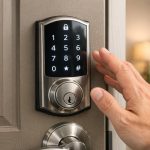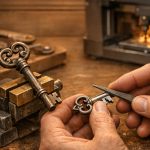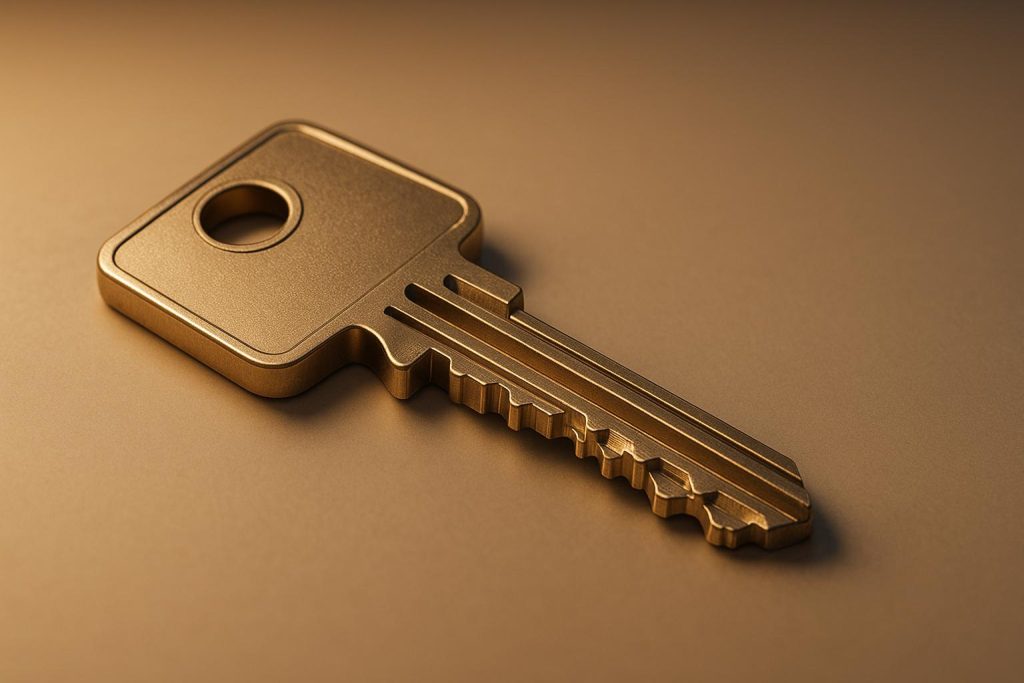High-security keys are designed to make duplication extremely difficult without proper authorization. Their advanced designs, such as unique grooves, angled cuts, and durable materials, require specialized tools and certified locksmiths for duplication. Additionally, strict legal restrictions and tracking systems ensure that only authorized individuals can request copies. These keys are commonly used in commercial buildings, government facilities, and vehicles for added security.
Key Takeaways:
- Duplication is tightly controlled and requires certified locksmiths.
- Features like patented keyways, electronic components, and durable materials prevent easy copying.
- Legal safeguards, documentation, and tracking systems ensure security.
For reliable duplication, always work with certified professionals who follow proper procedures and use advanced tools.
Ask Mr Locksmith: What Keys Can’t Be Duplicated?
Why High-Security Keys Are Hard to Duplicate
Duplicating high-security keys isn’t a simple task. These keys are designed with multiple layers of protection – ranging from intricate physical features to strict legal safeguards – that make unauthorized copies nearly impossible to create without proper authorization.
Complex Key Design and Materials
The design of high-security keys is far more intricate than standard keys, making duplication a challenge. These keys often feature unique grooves, angled cuts, multi-level bitting patterns, and even side cuts, dimples, or magnetic components that require specialized machinery to replicate accurately. Unlike regular keys with straightforward cuts, these advanced designs add a whole new level of complexity.
Inside the locks themselves, the mechanics are equally sophisticated. Many high-security systems employ security pins, sidebar mechanisms, or rotating discs, all of which interact with the key in precise ways. For instance, technologies like sidebar and telescopic pins demand expert tools and knowledge to duplicate properly.
The materials used in high-security keys also play a big role in their resistance to duplication. These keys are often crafted from hardened steel or durable alloys, which are much tougher than the materials used for standard keys. This makes them resistant to wear, breaking, and tampering. Cutting or filing these materials requires advanced, professional-grade equipment that unauthorized individuals typically don’t have access to.
Legal Restrictions and Authorization Requirements
Beyond their physical complexity, high-security keys are protected by legal measures that make unauthorized duplication illegal. Many of these keys are covered by patents, which give manufacturers exclusive rights over the production of key blanks and duplication processes. This means only authorized locksmiths, working under strict guidelines, can legally create duplicates.
To enforce these restrictions, manufacturers require locksmiths to register with them and maintain detailed records of every duplication. This ensures that only verified key holders can request copies. Violating these restrictions carries serious consequences, including civil liability, criminal charges, and voided warranties on security systems. Locksmiths who bypass these rules risk losing their licenses or facing legal action from manufacturers or property owners. These strict measures ensure that duplication remains tightly controlled and secure.
Key Control and Tracking Systems
Adding another layer of security, key control systems track every issued key and log all duplication requests. These systems require signatures and detailed records for each duplicate, creating an audit trail that holds everyone accountable.
Professional locksmiths rely on these tracking methods to maintain security. For example, when duplicating automotive keys, locksmiths must verify details like the vehicle’s year, make, model, registration number, and Vehicle Identification Number (VIN). If a key is lost or stolen, the system can be reprogrammed to render the old key useless, ensuring continued security.
In commercial and institutional settings, key control is even more critical. Facilities like hospitals, schools, and office buildings often use restricted keyways and maintain logs where only authorized personnel can request duplicates. Every transaction is recorded with timestamps and authorization details, minimizing the risk of lost or stolen keys being copied without detection.
This combination of advanced physical designs, legal protections, and strict administrative controls makes high-security key duplication a highly regulated process. It requires professional expertise, proper authorization, and specialized tools to ensure that security is never compromised.
How Professional Locksmiths Duplicate High-Security Keys
Duplicating high-security keys is no simple task. Certified locksmiths use cutting-edge tools and follow strict procedures to ensure accuracy and security. These professionals are trained to navigate both the technical and legal challenges of key duplication, making them the go-to experts for this specialized work. Here’s a closer look at how they get the job done.
Specialized Equipment and Technology
High-security keys often feature intricate designs that require more than just traditional tools to replicate. Professional locksmiths use advanced equipment like computer-assisted and laser cutting machines to handle these complexities with precision. Laser cutters are especially useful for automotive and commercial keys, as they engrave detailed patterns and work with hardened materials while maintaining flawless accuracy.
If the original key is lost or damaged, locksmiths rely on code-cutting systems. These systems use manufacturer codes to create a new key from scratch, bypassing the need for a physical template.
| Duplication Method | Accuracy | Security Level | Equipment Required |
|---|---|---|---|
| Manual Cutting | Moderate | Low | Hand tools |
| Machine Duplication | High | Moderate | Key cutting machines |
| Laser Cutting | Very High | High | Laser cutting equipment |
| Code Cutting | Very High | High | Code-cutting machines |
| Transponder Duplication | Very High | Very High | Programming devices |
Professional Duplication Process
The duplication process is more than just copying a key – it’s a meticulous procedure that ensures security and functionality. Locksmiths start by verifying the necessary documentation to confirm authorization. Once cleared, they select the appropriate key blank and program it using advanced, computerized cutting methods. Before handing over the key, they test it to ensure it operates perfectly.
Why Certified Locksmiths Matter
When it comes to high-security keys, certification isn’t just a bonus – it’s essential. Certified locksmiths are trained to follow complex verification protocols and comply with strict legal and security standards. This expertise protects property owners from unauthorized access and ensures that the duplication process is both safe and lawful.
"Our technicians are certified locksmiths with continuous training to stay up-to-date on the latest industry standards."
– Sherlock’s Locksmith
Unlicensed or poorly trained locksmiths can lead to issues like damaged keys, security breaches, or even legal trouble. Certified professionals, like those at Sherlock’s Locksmith, bring the necessary credentials and expertise to the table. Their team uses state-of-the-art equipment and follows rigorous protocols to ensure every key is duplicated accurately and securely.
Sherlock’s Locksmith has earned a 4.9 rating from 122 Google reviews, with customers praising their efficiency, timely service, and in-depth knowledge.
"When you hire Sherlock’s Locksmith, we ensure that you work with professionals who focus on quality and satisfaction. We are licensed, insured, and compliant to industry standards, so you have peace of mind knowing the job will be done reliably and to a high standard."
– Sherlock’s Locksmith
sbb-itb-643e28e
Legal and Security Rules for Key Duplication
High-security key duplication is tightly regulated to protect property owners and maintain the integrity of security systems in commercial, residential, and government settings.
Purpose of Duplication Restrictions
Restrictions on duplicating high-security keys are in place to prevent unauthorized access to secure properties. These controls help safeguard security systems in locations like commercial buildings, government facilities, and upscale homes, significantly reducing risks such as theft, vandalism, and other breaches. By ensuring that only authorized individuals can obtain duplicates, these measures add an extra layer of protection.
Many high-security systems rely on restricted keyways, meaning only certified locksmiths with proper manufacturer authorization can legally duplicate these keys. This restriction not only reinforces physical security but also ensures compliance with legal standards.
Legal Consequences of Unauthorized Duplication
The penalties for duplicating high-security keys without authorization can be severe, often involving both criminal charges and civil liability. While the exact consequences vary by state or jurisdiction, unauthorized duplication is treated as a serious offense.
For example, unauthorized key duplication has led to break-ins at commercial properties, resulting in lawsuits against the responsible locksmith or employee. In some cases, businesses have been forced to rekey entire facilities at considerable expense, with legal actions taken to recover damages.
Unauthorized duplication can lead to:
- Theft and burglary in residential or commercial properties
- Corporate espionage in business environments
- Identity theft through access to sensitive documents
- Vandalism and property damage
To prevent these risks, locksmiths are required to follow strict documentation protocols during the duplication process.
Required Documentation and Verification
Certified locksmiths must adhere to a thorough verification process before duplicating any high-security key. This isn’t just a best practice – it’s a legal obligation designed to protect both the locksmith and the property owner.
Standard documentation requirements include:
- Government-issued photo identification: A driver’s license or passport is required to confirm the identity of the person requesting the key duplication.
- Proof of property ownership or authorization: Acceptable forms include lease agreements, business letterhead, or written authorization from the property owner. For vehicle keys, additional details like the car’s registration number, make, and VIN are needed.
- The original key or key code card: In most cases, locksmiths require the original key. If it’s lost or stolen, additional verification steps are necessary, and the locksmith may need to reprogram the system to deactivate the old key.
- Controlled logging system: A signature-based logging system tracks every duplication request, creating an audit trail that records the customer’s identity, date, and reason for duplication. This deters unauthorized requests and allows property owners to monitor who has access to their premises.
Patented high-security key systems take this a step further by limiting duplication to authorized manufacturers and certified locksmiths. This provides a level of security that goes beyond local laws.
In Pittsburgh, PA, for example, locksmiths must comply with both state and local regulations, verifying authorization and maintaining detailed records. Professional services like Sherlock’s Locksmith ensure compliance by employing certified technicians, using advanced tracking systems, and requiring proper documentation before duplicating any high-security key.
These strict measures not only protect property owners from unauthorized access but also create a verifiable record that helps reduce theft risks and supports legal actions when necessary.
High-Security Key Duplication Services in Pittsburgh, PA
When it comes to high-security key duplication in Pittsburgh, working with a professional locksmith is essential. These experts ensure that even the most advanced key systems are duplicated with precision and care. Here’s a closer look at how professional services in Pittsburgh handle these complex needs.
Sherlock’s Locksmith Services
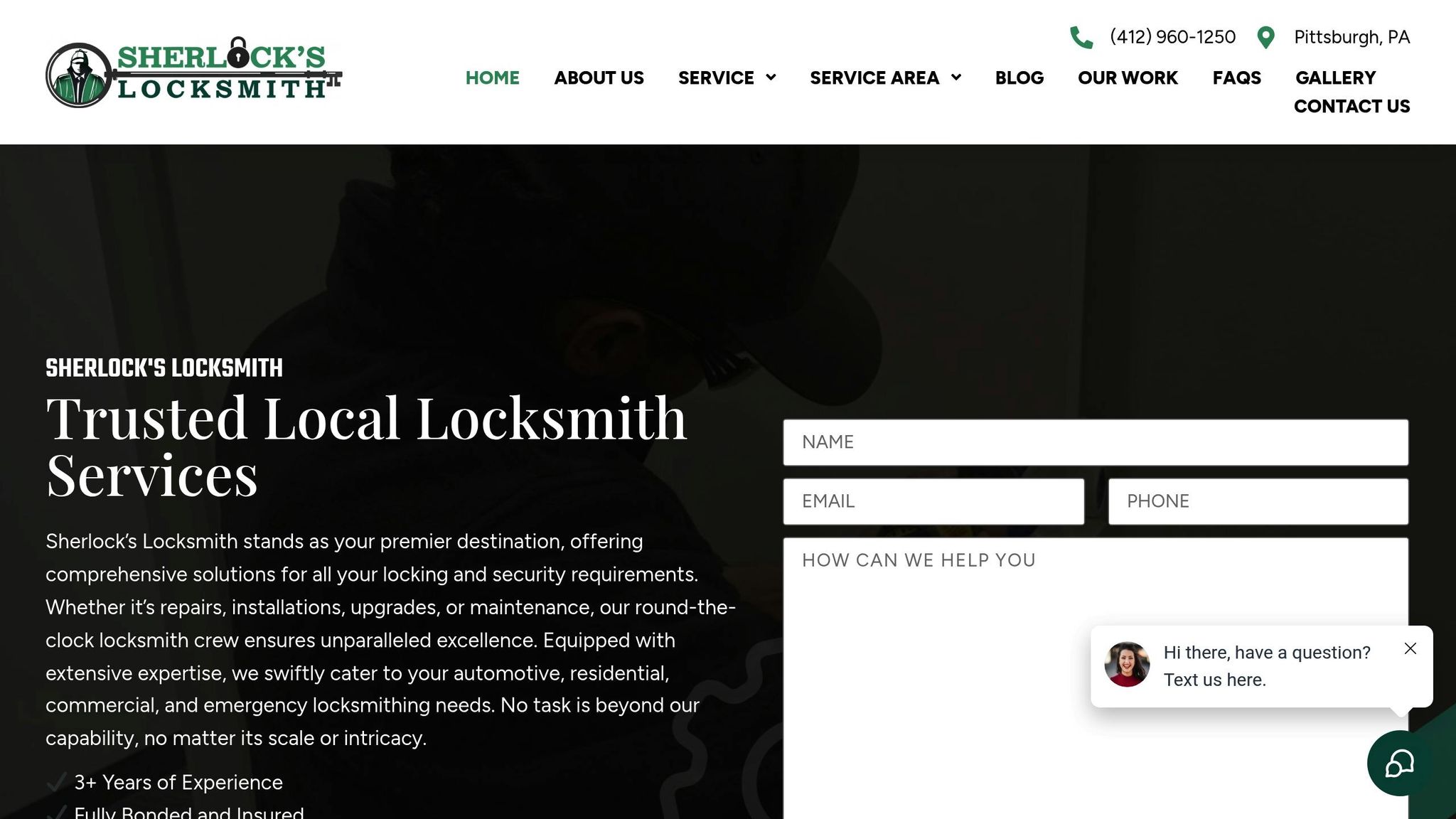
Sherlock’s Locksmith provides a wide range of high-security key duplication services for residential, commercial, and automotive clients in Pittsburgh, PA. From restricted keyways and laser-cut keys to transponder keys and master key systems, they use advanced tools to ensure accuracy and reliability.
Modern car keys often combine physical and electronic security features, and Sherlock’s Locksmith ensures these are duplicated correctly to maintain both security and functionality. For businesses, they specialize in duplicating intricate systems like master key arrangements, using computer-controlled and laser-based technology to meet strict manufacturer specifications. Plus, their mobile service brings all the necessary tools and transponder programming equipment directly to your location, saving time for businesses and reducing hassle for homeowners.
Local Compliance and Standards
Sherlock’s Locksmith operates within the bounds of state and local regulations, following U.S. legal standards and manufacturer guidelines. They verify customer authorization through secure logging systems and comply with recommendations from organizations like the Associated Locksmiths of America (ALOA).
For automotive key duplication, customers must provide specific documentation, such as the vehicle’s year, make, model, registration number, and VIN (Vehicle Identification Number). Similarly, duplicating restricted residential or commercial keys requires valid identification and proof of ownership or authorization. Some systems may require additional documentation, ensuring every duplication is handled responsibly and securely.
Why Choose Sherlock’s Locksmith?
One standout feature of Sherlock’s Locksmith is their 24/7 mobile service, ideal for urgent key duplication needs. All technicians are certified professionals who undergo regular training to stay updated on the latest technologies and industry standards. This dedication ensures a secure and efficient duplication process.
Sherlock’s Locksmith uses state-of-the-art tools and high-quality materials to deliver precise duplicates. Whether it’s electronic access credentials like high-frequency key fobs or automotive transponder keys, they program both the physical and electronic components to match the original perfectly.
Their secure logging systems and strict privacy protocols further enhance customer confidence. By combining advanced technology, adherence to legal standards, and round-the-clock availability, Sherlock’s Locksmith has become a trusted choice for Pittsburgh residents and businesses seeking reliable high-security key duplication services.
Conclusion: Professional Key Duplication Services
Main Points Summary
High-security key duplication is no simple task. It involves advanced technology, strict legal compliance, and specialized skills that go far beyond basic key copying. These systems require cutting-edge equipment to ensure precise duplication. Professional locksmiths have access to tools and expertise that are not readily available to the general public. The process is made even more challenging by the intricate design of high-security keys and the legal restrictions tied to key control systems, which meticulously track every copy made .
When it comes to transponder keys, the process is even more demanding. Not only does the physical key need to be duplicated with absolute accuracy, but the electronic programming must also be perfectly integrated. Even the smallest error can render the duplicate useless. On top of that, legal requirements add another layer of complexity. Reputable locksmiths use signature-controlled logging systems to document every duplication, ensuring a secure and traceable process that protects both the property owner and the locksmith while meeting legal standards . This intricate process highlights why professional expertise is essential.
Getting Professional Key Services
For residents and businesses in Pittsburgh, certified locksmiths provide both the security and functionality you need. These professionals have the training, tools, and legal authorization to handle high-security systems with care and precision. The cost of professional duplication – ranging from $50 to $150 or more per key – reflects the sophisticated technology and rigorous verification processes involved.
Sherlock’s Locksmith offers a full range of high-security key duplication services. Their certified technicians stay up-to-date with the latest technologies and industry standards. With their 24/7 mobile service, they bring advanced duplication equipment straight to your location. By combining precision tools with strict authorization protocols and detailed record-keeping, Sherlock’s Locksmith ensures a level of security and reliability that unauthorized methods simply can’t match. For precise, secure, and legally compliant key duplication, Sherlock’s Locksmith is a trusted choice.
Relying on certified professionals for your key duplication needs not only guarantees immediate access but also preserves the integrity of your overall security system.
FAQs
How can I safely and legally duplicate high-security keys?
Duplicating high-security keys involves adhering to strict legal and security protocols to safeguard your property and prevent any unauthorized access. It’s crucial to rely on a certified professional locksmith who is experienced in handling high-security key duplication. These experts will confirm your ownership and ensure the process aligns with all required regulations.
For instance, locksmiths like those at Sherlock’s Locksmith possess the specialized tools and skills necessary to duplicate high-security keys without compromising their quality or functionality. By working with such professionals, you can trust that your keys will be duplicated securely and responsibly.
How can I tell if my key needs a certified locksmith for duplication?
If you have a high-security key, duplicating it usually calls for a certified locksmith. These keys often come with advanced features such as unique cuts, restricted keyways, or patented designs, all aimed at preventing unauthorized copies.
For a secure and accurate duplication, rely on a professional locksmith like Sherlock’s Locksmith. Their certified technicians have the specialized tools and expertise needed to handle high-security key duplication with care and precision.
What could happen if you try to duplicate a high-security key without proper authorization?
Attempting to copy a high-security key without proper permission can lead to serious trouble – both legally and financially. Many of these keys are protected by patents or come with restrictions set by manufacturers, meaning unauthorized duplication could break intellectual property laws. On top of that, it might also violate agreements or policies set by property owners or organizations, opening the door to fines, penalties, or even legal action.
To steer clear of these issues, always rely on a certified locksmith who can confirm the required permissions before making a copy. Professionals, like the team at Sherlock’s Locksmith, are trained to navigate these situations while staying fully compliant with legal and ethical standards.



